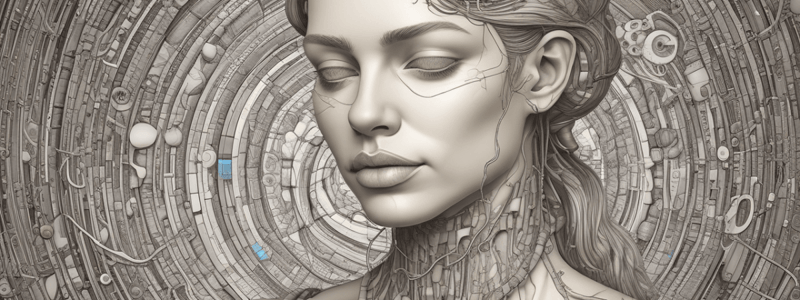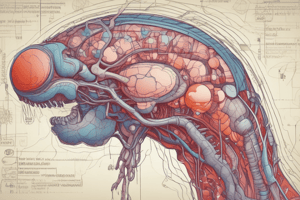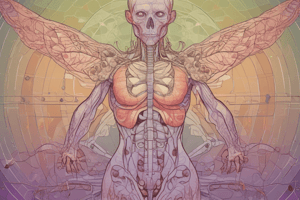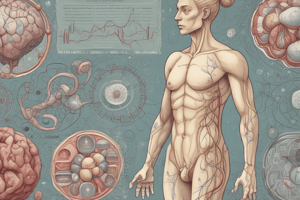Podcast
Questions and Answers
What is the unit of measurement for hormone concentration in the blood?
What is the unit of measurement for hormone concentration in the blood?
- Micrograms per milliliter
- Grams per milliliter
- Milligrams per milliliter
- Picograms per milliliter (correct)
How do hormones reach their target organs?
How do hormones reach their target organs?
- Through a direct path
- Through the nervous system
- Like radio waves, flowing throughout the body (correct)
- Through the digestive system
What is the main mechanism that affects hormone concentration?
What is the main mechanism that affects hormone concentration?
- Neither secretion nor metabolism
- Secretion only
- Both secretion and metabolism (correct)
- Metabolism only
What is the purpose of a feedback loop in regulating hormone concentration?
What is the purpose of a feedback loop in regulating hormone concentration?
What type of feedback loop is the main way that secretion is controlled?
What type of feedback loop is the main way that secretion is controlled?
What role does the endocrine system play in behavior?
What role does the endocrine system play in behavior?
What is the bridge between the physiology of the endocrine system and the psychology of behavior?
What is the bridge between the physiology of the endocrine system and the psychology of behavior?
What is based on the idea that the mind can control physiological responses, including hormone production and regulation?
What is based on the idea that the mind can control physiological responses, including hormone production and regulation?
What type of signal has receptors near the cells that produce them?
What type of signal has receptors near the cells that produce them?
What percentage of hormones are metabolized and excreted?
What percentage of hormones are metabolized and excreted?
Why are hormones present everywhere in the body, but their effect is determined by where the receptors are located?
Why are hormones present everywhere in the body, but their effect is determined by where the receptors are located?
What happens to most hormones that are released into the blood?
What happens to most hormones that are released into the blood?
What is the primary role of the liver and kidneys in hormone regulation?
What is the primary role of the liver and kidneys in hormone regulation?
What stops hormone production when the desired effect is achieved?
What stops hormone production when the desired effect is achieved?
What is the result of the coordinated hormonal responses in the endocrine system?
What is the result of the coordinated hormonal responses in the endocrine system?
What determines the effect of a hormone in the body?
What determines the effect of a hormone in the body?
What is an example of a hormone that stimulates the hypothalamus and anterior pituitary to stop producing a hormone when enough is present?
What is an example of a hormone that stimulates the hypothalamus and anterior pituitary to stop producing a hormone when enough is present?
What is the purpose of the negative feedback loop in hormone regulation?
What is the purpose of the negative feedback loop in hormone regulation?
What type of signal has receptors far away from the cells that produce them?
What type of signal has receptors far away from the cells that produce them?
What is the underlying principle of cognitive behavioral therapy?
What is the underlying principle of cognitive behavioral therapy?
What is the primary reason why hormones can affect multiple parts of the body?
What is the primary reason why hormones can affect multiple parts of the body?
What is the result of a negative feedback loop in hormone regulation?
What is the result of a negative feedback loop in hormone regulation?
What determines the specificity of hormone action?
What determines the specificity of hormone action?
What is the consequence of unregulated hormone production?
What is the consequence of unregulated hormone production?
What is the relationship between the endocrine system and behavior?
What is the relationship between the endocrine system and behavior?
What is the function of autocrine signals?
What is the function of autocrine signals?
What is the purpose of hormone metabolism?
What is the purpose of hormone metabolism?
What is the role of the liver and kidneys in hormone regulation?
What is the role of the liver and kidneys in hormone regulation?
What is the underlying principle of hormone regulation?
What is the underlying principle of hormone regulation?
What is the result of coordinated hormonal responses?
What is the result of coordinated hormonal responses?
Study Notes
Hormone Concentration
- Hormones are present in small amounts in the blood, measured in picograms per milliliter (one millionth of one millionth of a gram)
- Despite the small amount, hormones are present everywhere in the body, but their effect is determined by where the receptors are located
How Hormones Reach Their Destination
- Hormones are released into the blood, but there is no direct path to their target organs
- Hormones are like radio waves, flowing throughout the body, but only picked up by receptors that are "tuned in" to them
- Autocrine signals have receptors near the cells that produce them, paracrine signals have receptors close to the cells that produce them, and endocrine signals have receptors far away from the cells that produce them
Regulation of Hormone Concentration
- Metabolism affects concentration, with the liver and kidneys breaking down and excreting hormones
- For every hormone that reaches its destination, 99% or more are metabolized and excreted
- Secretion also affects concentration, through a feedback loop that stops hormone production when the desired effect is achieved
Feedback Loop
- A feedback loop is a mechanism where the products of a hormone's action stimulate the cessation of hormone production
- Example: Thyroid hormones stimulate the hypothalamus and anterior pituitary to stop producing thyroid-stimulating hormone when enough thyroid hormones are present
Negative Feedback Loop
- The main way that secretion is controlled is through a negative feedback loop
- The negative feedback loop ensures that the body doesn't overproduce hormones and maintains a balance
Endocrine System and Behavior
- The endocrine system plays a crucial role in behavior, as hormones signal effects in different parts of the body that influence behavior
- The bridge between the physiology of the endocrine system and the psychology of behavior is formed through the coordinated hormonal responses
- Cognitive behavioral therapy is based on the idea that the mind can control physiological responses, including hormone production and regulation
Hormone Concentration
- Hormones are present in extremely small amounts in the blood, with concentrations measured in picograms per milliliter.
- Despite their small presence, hormones have a widespread impact throughout the body, with their effects determined by receptor location.
Hormone Transmission
- Hormones are released into the bloodstream, but there is no direct path to their target organs.
- Hormones function like radio waves, circulating throughout the body, but only responding to specific receptors that are "tuned in" to them.
- Autocrine signals have nearby receptors, paracrine signals have close receptors, and endocrine signals have distant receptors.
Hormone Regulation
- Metabolism, primarily through the liver and kidneys, affects hormone concentration by breaking down and excreting excess hormones.
- Only a small percentage of hormones (less than 1%) reach their destination, with the majority being metabolized and excreted.
- Hormone secretion is regulated through a feedback loop, stopping production when the desired effect is achieved.
Feedback Loops
- A feedback loop is a mechanism where hormone products stimulate cessation of hormone production.
- Thyroid hormones, for example, stimulate the hypothalamus and anterior pituitary to stop producing thyroid-stimulating hormone when sufficient.
Negative Feedback Loop
- The primary mechanism controlling hormone secretion is the negative feedback loop.
- This loop ensures the body maintains a balance and prevents overproduction of hormones.
Endocrine System and Behavior
- The endocrine system plays a crucial role in influencing behavior through hormonal signals.
- The coordination of hormonal responses forms the connection between the physiology of the endocrine system and the psychology of behavior.
- Cognitive behavioral therapy is based on the idea that the mind can control physiological responses, including hormone regulation.
Hormone Concentration
- Hormones are present in extremely small amounts in the blood, with concentrations measured in picograms per milliliter.
- Despite their small presence, hormones have a widespread impact throughout the body, with their effects determined by receptor location.
Hormone Transmission
- Hormones are released into the bloodstream, but there is no direct path to their target organs.
- Hormones function like radio waves, circulating throughout the body, but only responding to specific receptors that are "tuned in" to them.
- Autocrine signals have nearby receptors, paracrine signals have close receptors, and endocrine signals have distant receptors.
Hormone Regulation
- Metabolism, primarily through the liver and kidneys, affects hormone concentration by breaking down and excreting excess hormones.
- Only a small percentage of hormones (less than 1%) reach their destination, with the majority being metabolized and excreted.
- Hormone secretion is regulated through a feedback loop, stopping production when the desired effect is achieved.
Feedback Loops
- A feedback loop is a mechanism where hormone products stimulate cessation of hormone production.
- Thyroid hormones, for example, stimulate the hypothalamus and anterior pituitary to stop producing thyroid-stimulating hormone when sufficient.
Negative Feedback Loop
- The primary mechanism controlling hormone secretion is the negative feedback loop.
- This loop ensures the body maintains a balance and prevents overproduction of hormones.
Endocrine System and Behavior
- The endocrine system plays a crucial role in influencing behavior through hormonal signals.
- The coordination of hormonal responses forms the connection between the physiology of the endocrine system and the psychology of behavior.
- Cognitive behavioral therapy is based on the idea that the mind can control physiological responses, including hormone regulation.
Hormone Concentration
- Hormones are present in extremely small amounts in the blood, with concentrations measured in picograms per milliliter.
- Despite their small presence, hormones have a widespread impact throughout the body, with their effects determined by receptor location.
Hormone Transmission
- Hormones are released into the bloodstream, but there is no direct path to their target organs.
- Hormones function like radio waves, circulating throughout the body, but only responding to specific receptors that are "tuned in" to them.
- Autocrine signals have nearby receptors, paracrine signals have close receptors, and endocrine signals have distant receptors.
Hormone Regulation
- Metabolism, primarily through the liver and kidneys, affects hormone concentration by breaking down and excreting excess hormones.
- Only a small percentage of hormones (less than 1%) reach their destination, with the majority being metabolized and excreted.
- Hormone secretion is regulated through a feedback loop, stopping production when the desired effect is achieved.
Feedback Loops
- A feedback loop is a mechanism where hormone products stimulate cessation of hormone production.
- Thyroid hormones, for example, stimulate the hypothalamus and anterior pituitary to stop producing thyroid-stimulating hormone when sufficient.
Negative Feedback Loop
- The primary mechanism controlling hormone secretion is the negative feedback loop.
- This loop ensures the body maintains a balance and prevents overproduction of hormones.
Endocrine System and Behavior
- The endocrine system plays a crucial role in influencing behavior through hormonal signals.
- The coordination of hormonal responses forms the connection between the physiology of the endocrine system and the psychology of behavior.
- Cognitive behavioral therapy is based on the idea that the mind can control physiological responses, including hormone regulation.
Studying That Suits You
Use AI to generate personalized quizzes and flashcards to suit your learning preferences.
Description
Learn how hormones are present in small amounts in the blood and flow throughout the body to reach their target organs, and how their effect is determined by receptor location.




